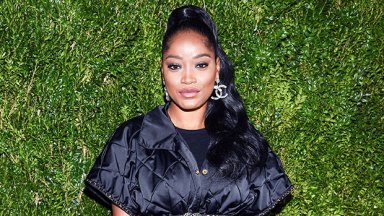
“Imagine if your EBT card could only work on healthy items,” tweeted Keke Palmer on Nov. 9. With a single tweet, the Hustlers star kicked the political hornets’ nest, with many angry people filling up her mentions. Many thought that Keke, 27, was trying to dictate what people on the Supplemental Nutritional Assistance Program (aka SNAP, aka Electronic Benefits Transfer, aka “food stamps”) could and could not eat. After a bitter back and forth by people who missed out on her earlier musings, Keke fired back. “
“To clarify, my tweet was pertaining to issues w/ healthy foods being 2 expensive & thinking it should be free for those w/ EBT cards,” she tweeted. “This was not a suggestion for solving all low-income issues. Solely a hopeful solution 4 those with EBT that want to run it up w/ meat & produce.”
Imagine if your EBT card could only work on healthy items …. 👀👀👀👀
— Keke Palmer (@KekePalmer) November 9, 2020
Hey @KamalaHarris I know you just started but me and my friends were talking about it and we think EBT cards should swipe free on all items considered HEALTHY. Xoxo
— Keke Palmer (@KekePalmer) November 9, 2020
So, how did all this begin? It started when Keke harmlessly tweeted the cost difference between eating “healthy” food and the generic products found in any grocery store. “You never realize what healthy food is actually worth until you decide to eat extremely healthy and notice that everything is a million dollars!!!” Keke first tweeted. “I see corporations know the nutritious [value] off the top.” After talking diet with her fans, she posed the “if EBT card(s) could only work on healthy items.” She did change the position shortly afterward, tweeting, “Hey @KamalaHarris. I know you just started, but me and my friends were talking about it, and we think EBT cards should swipe free on all items considered HEALTHY. Xoxo.”
Yea maybe you shouldn’t focus on thinking I’m “rich.” I think that creates a defensive nature.
I’m saying healthy food should be free to those that can’t afford them often. They shouldn’t have a limit they should be free if you make a certain amount. https://t.co/V2cRZMkvDW
— Keke Palmer (@KekePalmer) November 9, 2020
The gag is, no one gaf about eating healthy. HAHAHAHAHAHAHHAH
— Keke Palmer (@KekePalmer) November 9, 2020
Many of Keke’s critics just saw the first tweet. “This was really just weighing on your spirit?????? What a burden,” one tweeted. “Ooh, Keke, I gotta disagree here. Poor people are allowed to buy Doritos. We shouldn’t be policing the poor. If they have a craving for ice cream or wanna stock up on TV dinners cause they have to work late, then they are allowed.”
Keke eventually directed her followers to her Instagram, where she provided greater context to her thoughts. “I have been eating extremely healthy lately, and I have been sad about my debit card balance because of it,” she wrote. “Healthy food is more expensive for a reason. It’s fresh, good for you, and gives you energy. Bad foods are bad for a reason. They last long, they taste good because of tons of sodium, and they aren’t expensive because they’re honestly not food. Mostly likely, they are food-LIKE products.”
https://www.instagram.com/p/CHXwTK2j16L/
Let’s think about it. Some type of Uber credit or just making sure every neighborhood has a fresh food store. I used to work with this company Urban Farming when I was a kid and we would farm in urban neighborhoods so they would have fresh food for free! https://t.co/VIyJfXPgbr
— Keke Palmer (@KekePalmer) November 9, 2020
“In any event, imagine if you could get whatever healthy foods you wanted on your EBT card. Like all the healthy foods could swipe for free. Pretty much a reward for being healthy but even more so giving homes a break that want to eat healthy but can’t afford it!”
Those who qualify for the Supplemental Nutrition Assistance Program (SNAP) are eligible to buy: fruits and vegetables; meat, poultry, and fish; dairy products; breads and cereals; other foods such as snack foods and non-alcoholic beverages; and Seeds and plants, “which produce food for the household to eat.” You cannot buy alcohol, tobacco products, prepared foods, hot foods, vitamins, supplements, live animals (except fish removed from water, shellfish), and non-food items.
Despite the program’s success, the Center on Budget and Policy Priorities claimed in 2019 that roughly half of all households on SNAP are still food insecure, “meaning they lack consistent access to enough food to support an active, healthy life. Even those who achieve food security often find it hard to stretch their limited resources far enough to purchase and consume a healthy diet. These facts suggest that SNAP’s relatively modest benefits — which average less than $1.40 per person per meal — may not be enough to meet the needs of America’s poor.”


